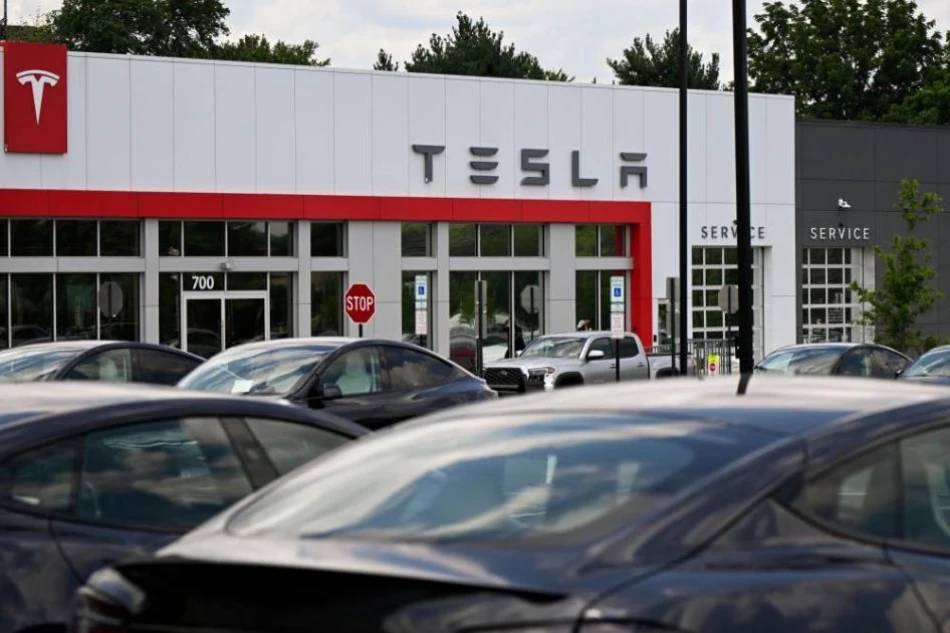
Tesla's Q2 Revenue Plunge: $22.5B as Production Woes Linger
Tesla's Perfect Storm: Musk Warns of "Tough Quarters" as Tax Credits Vanish and Political Drama Unfolds
Tesla faces a challenging period ahead as CEO Elon Musk cautioned investors about potential "tough quarters" following the elimination of federal EV tax credits under Trump's fiscal package. The warning comes as the electric vehicle giant reported its third consecutive quarter of declining profits, highlighting deeper structural challenges beyond temporary policy shifts that could reshape the company's trajectory through 2026.
The Numbers Tell a Sobering Story
Tesla's Q2 earnings dropped 16% year-over-year to $1.2 billion, while revenue fell 12% to $22.5 billion. These figures reflect more than cyclical market pressures—they signal a company in transition, caught between its current automotive business and Musk's ambitious vision of an AI-powered robotics future.
The decline stems from multiple headwinds: reduced vehicle deliveries, lower average selling prices, and increased operational expenses driven by AI and autonomous driving investments. Notably, Tesla declined to provide full-year production guidance, citing global trade policy shifts and broader macroeconomic uncertainties.
The $7,500 Question: Life After Tax Credits
The elimination of the $7,500 federal EV tax credit on September 30 represents a critical inflection point for Tesla's mass-market appeal. Unlike competitors who may benefit from the policy shift by gaining relative market share, Tesla has historically relied on these incentives to make its vehicles accessible to middle-class buyers.
Tesla executives revealed they delayed new model production to maximize current-generation vehicle output before the tax credit expires—a strategic move that underscores the policy's importance to their business model.
Market Positioning in a Post-Incentive World
Without federal support, Tesla must compete purely on merit against increasingly capable rivals from traditional automakers and Chinese manufacturers. This shift could accelerate the company's pivot toward its long-promised $25,000 affordable model, though analysts remain skeptical about delivery timelines given Musk's history of missed deadlines.
The Autonomous Driving Gambit
Musk's confidence hinges on achieving "unsupervised full self-driving at scale by the second half of 2026." This timeline represents both Tesla's greatest opportunity and its biggest risk. The recent launch of robotaxi services in Austin marks progress, but the technology faces regulatory hurdles and technical challenges that have historically proven more complex than Musk's projections.
If successful, autonomous driving could transform Tesla from a car company into a mobility platform with recurring revenue streams. If delayed further, the company risks losing its technological edge while burning cash on R&D.
Political Theater with Real Business Consequences
The relationship between Musk and Trump has evolved from alliance to antagonism, creating unprecedented complications for Tesla. Musk's journey from major Trump campaign donor to government efficiency czar to political opponent illustrates how personal dynamics can impact corporate strategy.
Brand Damage and Consumer Backlash
Musk's political activities have triggered boycotts and brand reputation challenges that extend beyond typical CEO controversies. His departure from the White House in May and subsequent criticism of Trump's fiscal policies culminated in launching the "America Party"—a move that prompted Trump to threaten deportation and contract cancellations.
This political drama occurs precisely when Tesla needs broader market appeal to offset the loss of tax incentives, creating a self-reinforcing cycle of challenges.
Wall Street's Split Verdict
Analyst opinions reflect Tesla's contradictory position. JPMorgan Chase analysts describe Tesla's stock price as "completely disconnected from increasingly deteriorating fundamentals," focusing on near-term automotive challenges. Conversely, Morgan Stanley maintains Tesla as a "top pick" based on its AI and robotics leadership, despite acknowledging political risks.
This divergence highlights the fundamental question facing Tesla: Is it a struggling car company or a future technology platform? The answer will likely determine whether Musk's prediction of "very compelling" economics by 2026 proves accurate or overly optimistic.
The Path Forward
Tesla's immediate challenge involves navigating the transition period between its current automotive business and its autonomous future. Success requires executing on multiple fronts simultaneously: maintaining EV market share without tax incentives, delivering autonomous driving technology, and managing political controversies that affect brand perception.
The company's decision to prioritize current production over new model development suggests management recognizes the urgency of maximizing revenue before policy changes take effect. However, this short-term focus may conflict with long-term innovation needs, particularly as competitors accelerate their own autonomous driving programs.
Tesla's stock dropped 4.1% in after-hours trading following the earnings call, reflecting investor uncertainty about the company's ability to navigate these converging challenges while maintaining its premium valuation.
Most Viewed News

 Omar Rahman
Omar Rahman






